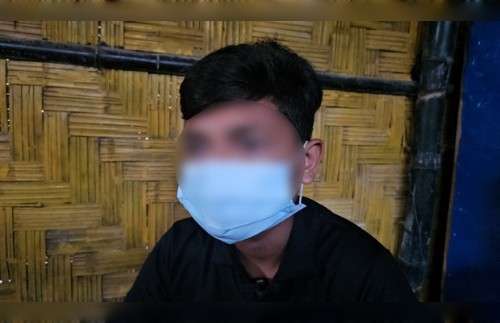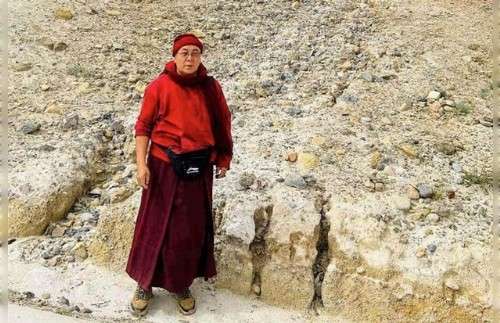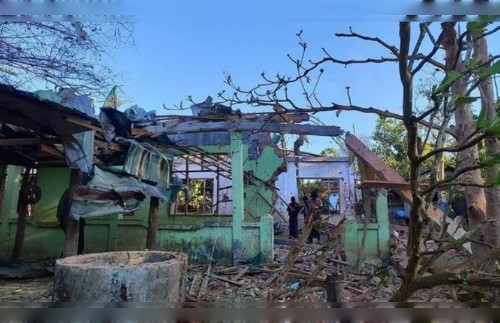Chinese authorities arrested Rahile Dawut in late 2017 during a purge of Uyghur intellectuals.

An internationally recognized expert in Uyghur folklore and ethnographer who disappeared in China’s Xinjiang Uyghur Autonomous Region (XUAR) more than three years ago has been confirmed as being imprisoned by authorities, according to her former co-workers at Xinjiang University.
Rahile Dawut, 55, created and directed the university’s Minorities Folklore Research Center and wrote dozens of articles in international journals and a number of books, including studies on Islamic sacred sites in Central Asia, and presented her work at conferences around the world.
An anthropologist by training, she disappeared in December 2017, believed to be arrested and detained in one of the many internment camps in a mass incarceration campaign launched that year by Chinese authorities, who to date have not provided information on her whereabouts or the charges against her.
Rahile was in fact detained along with other members of the Uyghur intellectual and cultural elite, sentenced, and is now in prison, RFA’s Uyghur Service discovered early this month through a series of interviews with employees of Xinjiang University.
Rahile, one of many Uyghur intellectuals silenced by Chinese authorities as part of a campaign to remove influential educators, disappeared suddenly from public life, along with Tashpolat Teyip, Arslan Abdulla, and other prominent professors at Xinijang University in the XUAR’s capital Urumqi (in Chinese, Wulumuqi).
A female staffer in the administrative office at Xinjiang University told RFA that Rahile had been out of work for some time, and that authorities had notified the university that she had been sentenced to prison.
“Yes, they notified us,” she said.
The staffer, who spoke on condition of anonymity due to the sensitivity of the case, also told RFA that the university issued an internal notice to the faculty about Rahile’s sentencing at the end of 2020.
Another official surnamed Zhao from the university’s Department of Propaganda confirmed that Rahile had been arrested but said he could not provide further information.
‘I could no longer be silent’
Akida Polat, Rahile’s daughter who is now based in the United States, told RFA that the last time they spoke in December 2017, her mother told her she was taking a very urgent trip to Beijing for a conference. Akida has not been able to reach her since then.
“The last time I spoke with my mom, talked with her, was December 12, 2017,” she said. “That day, my mom was in a rush and told me she was going to Beijing and she would call me back once she got to Beijing. Then she disappeared without a trace.”
With detentions of Uyghurs widespread in the XUAR at the time, Akida said she felt uneasy about her mother attending a conference but tried to console herself by telling herself that there must have been some kind of misunderstanding. But that exchange was the last she heard from her mother.
“News about them taking Uyghurs into camps had just started to come out at the time, so a week later, after I still hadn’t been able to find any trace of my mom, I got a bit suspicious and wondered whether they had taken her to a camp as well, but I decided to wait a bit,” she said. “One month later, I still hadn’t gotten any news about my mom, and so I felt certain they had detained her.”
China has held up to 1.8 million Uyghurs in a network of detention camps since 2017, with and smaller numbers of Kazakhs and Kyrgyz, fellow Turkic speaking people, also been incarcerated in the system. Beijing says the camps are vocational training or re-education centers aimed at combating extremism in the XUAR.
By late 2018, Akida received information that her mother was being held in custody. Realizing that her year of silence on the matter had been useless, Akida decided to go public about the situation in late 2019 when she published a website with information about her mother.
“I learned through acquaintances that they [Chinese authorities] had detained my mom, she said. … In the process of looking for her I had read so many things about Uyghurs in the news and began to sense that we were facing a genocide. In summer 2019, I decided I could no longer be silent and that I would testify about my mother.”
The U.S. State Department, in a report to Congress on Monday, put China on a short list of countries including Myanmar, Ethiopia, Iraq, Syria, and South Sudan that are experiencing atrocities and crimes against humanity, reiterating Washington’s six-month-old determination of genocide in the XUAR.
“Secretary (Antony) Blinken affirmed in January 2021 that the People’s Republic of China is committing genocide and crimes against humanity against Uyghurs, who are predominantly Muslim, and members of other ethnic and religious minority groups in Xinjiang. The crimes against humanity include imprisonment, torture, enforced sterilization, and persecution,” the Elie Wiesel Genocide and Atrocities Prevention Act report stated.
Akida told RFA that her anger about her mother’s imprisonment at the hands of the Chinese government serves as motivation for her advocacy.
“I was so angry when I heard the news about my mother, but the anger made me even stronger. I will never stop [fighting for] my mother’s cause, and I will continue it even stronger,” she said.
In January this year, Akida began working for the U.S.-based Campaign for Uyghurs, a nonprofit organization that advocates for the democratic rights and freedoms of Uyghurs in the XUAR and elsewhere, to further her mother’s cause.
Rahile’s disappearance had been reported by the international media, including The New York Times, The Washington Post, and The Diplomat. Chinese authorities have yet to provide any information to either Akida or concerned members of the international community.

Keeping her case under wraps
At several news conferences over the past two years, Chinese authorities have tried to rebut the testimony of some Uyghurs abroad by disclosing partial information about their missing family members. But they have never mentioned Rahile Dawut at the media events.
Some reports on social media have suggested that Rahile has serious health problems due to torture or psychological strain she has suffered in prison, and that authorities are keeping her case under wraps for this reason.
The lack of information about Rahile from Chinese authorities has raised the visibility of her case among members of the international community. Following her disappearance, scholarly societies issued letters and statements about her, and she received several international academic awards in absentia.
The Open Society University Network named her an honorary professor in the humanities in December 2020, and New York-based Scholars at Risk, an international network of institutions and individuals whose mission is to protect scholars and promote academic freedom, awarded her the Courage to Think Award in November 2020. Both groups have issued statements to the Chinese government asking for information about Rahile and calling for her immediately release to no effect.
Rahile likely was arrested because of her research into mazars (shrines) and the manner in which she dealt with local and autonomous region-level authorities to resolve issues that posed obstacles to her work, said a Xinjiang University police officer who declined to give his name.
The officer contacted by RFA said he had received a special notice about Rahile’s supposed “crime,” stating that the scholar had caused social “provocations,” between farmers and the government. The officer said he didn’t remember the length of Rahile’s prison sentence.
When asked where Rahile was serving her sentence, he said, “They told us not to talk about this with other people and that we should be careful with what we heard.”
Mehriay Mamteli, an independent researcher living in the U.S. and one of Rahile’s former colleagues, said that authorities might have used the professor’s research into Uyghur shrines as evidence for the charges.
Although Rahile received national grants and worked under the guidance of the well-known ethnic Han researcher Zhong Jinwen at Beijing Normal University in the Chinese capital, she still encountered obstacles when researching shrines in the XUAR’s Tarim Basin because of long-standing restrictions and crackdowns on religious and cultural customs throughout the Uyghur region, said Mehriay.
“In the process of research, she encountered a lot of restrictions from the local governments and offices responsible for managing religious matters wherever she went for her fieldwork,” she said, adding that Rahile proceeded with her on-site research only after receiving official permission.
When Rahile explained the importance of her research to officials at the local and autonomous region levels, she told them that restrictions on certain sites and customs were misguided, Mehriay said.
“For the Chinese government to put this woman in prison and punish her for things [the government] approved itself, a researcher it trained itself, and to call her perhaps a ‘reactionary revolutionary’ or whatever excuse they have decided on, is a violation of China’s own laws,” Mehriay said.
Another source claiming familiarity with the situation, who requested anonymity out of fear of reprisal, said that many people were moved and encouraged by Rahile’s willingness to use research as a way of raising issues that farmers themselves dared not discuss with the relevant authorities.
But even though her concerns impressed some local officials, they raised suspicions in others, which Mehriay believes formed the basis of the accusations against Rahile.
An attack on China’s plan
Though Rahile’s research into Uyghur shrines was not directly related to politics, its close relationship to the spiritual heritage and ethnic identity of the Uyghurs could be perceived as an attack on China’s plan to eliminate Uyghur ethnic identity, said Alimcan Inayet, a Uyghur professor at Ege University in Turkey.
“As is known, our ethnic historical works and cultural heritage are very important in strengthening our ethnic consciousness and identity,” he told RFA. “The Chinese state is perhaps uneasy over this, or even afraid.”
“The Chinese state, which has made the assimilation of the Uyghurs its goal, has long been attempting to weaken Uyghur ethnic consciousness and Uyghur ethnic identity,” he said. “Things like banning books about our ethnic history, demolishing ancient structures, and destroying statues of important historical Uyghur figures, among others, demonstrate this very clearly.”
Another source familiar with the situation said that by targeting the professor, Chinese authorities tried to create a climate of isolation, intimidation, and eventual alienation from Uyghur cultural heritage among Uyghurs themselves.
Lisa Ross, an American photographer and visual artist currently based in the U.S., met Rahile at a Uyghur studies conference in London in 2004. They then collaborated on a photographic survey of Uyghur shrines and became close friends.
Ross told RFA that she was saddened to hear the confirmation of Rahile’s conviction, and that she now has a clearer idea of what must be done to secure her release.
“Because of her work, many people will continue to know and remember what and who the Uyghur people always have been for hundreds of years, and what their collective memory is, and so our job is to fight for her release,” Ross said.
Rachel Harris, an ethnomusicologist at SOAS at the University of London whose research focuses on Uyghur music, has known Rahile for more than 20 years. She told RFA she was impressed not only by Rahile’s academic credentials but also by her sincerity, humanity, and virtue.
“My hope is always that national governments will come together as a group and make a strong statement about what’s going on,” Harris said. “I have put pressure on my own university to raise a case.”
Reported by Shohret Hoshur and Gulchehra Hoja for RFA’s Uyghur Service. Translated by the Uyghur Service. Written in English by Roseanne Gerin.
Copyright © 1998-2020, RFA. Used with the permission of Radio Free Asia, 2025 M St. NW, Suite 300, Washington DC 20036. https://www.rfa.org


















